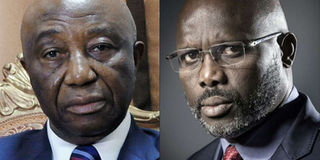Liberia presidential runoff set for December 26

This combination of file pictures created on October 27, 2017 shows Liberia Vice President Joseph Nyumah Boakai (L) posing in Monrovia on March 20, 2017 and former football player and candidate in Liberia's presidential elections, George Weah, in Paris on September 25, 2017. They will be the candidates in the presidential runoff set for December 26, 2017. PHOTO | ZOOM DOSSO AND JOEL SAGET | AFP
What you need to know:
- The runoff vote was triggered because no single candidate obtained more than 50 per cent in the first round, which was described as free and fair by international and domestic observers, despite some reported delays.
- But it was delayed for a month by fraud complaints. The Liberty Party candidate Charles Brumskine, who came third in the first round, claimed that ballot stuffing and false voter registration cards had marred the election — allegations backed up by second place Joseph Boakai.
- But the claims were rejected by the National Elections Commission (NEC), which found that the parties of the two candidates had failed to provide "indubitable evidence" that the vote was tainted.
- The Supreme Court then ordered the commission to proceed with the vote.
MONROVIA
The runoff in Liberia's presidential elections will be held on December 26, the country's electoral overseer announced on Tuesday, clearing a last hurdle in a protracted saga.
It means the final round of voting between the two leading candidates — ex-footballer George Weah and Vice President Joseph Boakai — can go ahead.
RUNOFF
"I am pleased to announce that the 2017 presidential runoff elections will be conducted on Tuesday, December 26, 2017," the president of the National Elections Commission (NEC), Jerome Korkoya, said.
"We realise that this day is immediately after Christmas Day," he said, adding: "We call on all registered voters to make that one sacrifice, for the love of our democracy."
The vote is seen as a crucial test of Liberia's stability after back-to-back civil wars between 1989 and 2003 and an Ebola crisis that killed thousands from 2014 to 2016.
Whoever wins will replace Liberia's Nobel Peace prize-winning president, Ellen Johnson Sirleaf, who is also Africa's first female elected head of state. She is stepping down after a maximum two six-year terms.
COURT ORDER
During her tenure, she steered the country away from the trauma of war, although poverty remains entrenched and has been one of the main election issues.
The runoff date was announced after the Supreme Court last Thursday ordered the commission to proceed with the vote after it was delayed for a month by fraud complaints.
The Liberty Party candidate Charles Brumskine, who came third in the first round, claimed that ballot stuffing and false voter registration cards had marred the election — allegations backed up by second place Boakai.
But the claims were rejected by the National Elections Commission (NEC), which found that the parties of the two candidates had failed to provide "indubitable evidence" that the vote was tainted.
ELECTION
Weah won 38.4 per cent to Boakai's 28.8 per cent in the first round of the election on October 10.
The runoff vote was triggered because no single candidate obtained more than 50 per cent in the first round, which was described as free and fair by international and domestic observers, despite some reported delays.
Campaigning for the second round has been immediately opened and will end on December 24, the electoral commission said.
Both candidates have both promised to improve education and create jobs, but also have sharp differences.
PROMISES
Weah, 51, the first African player to win both FIFA's World Player of the Year trophy and the Ballon d'Or, has leveraged his status as a revered figure among young people to boost his support.
After running unsuccessfully for the presidency in 2005 and in 2011, Weah became a senator in 2014 and says he has "gained experience".
After more than a decade in government, Boakai, 72, campaigned as a natural transition candidate and presented himself as an everyman who transcended his humble beginnings.
He has tried to promote his record in government while distancing himself from Sirleaf, and also attempted to craft a more energetic image after earning the unfortunate title of "Sleepy Joe", for sometimes falling asleep at public events.
NO BUSINESS
The delay in the vote has meanwhile led to many businesses feeling the pinch as customers have stayed home and the exchange rate has climbed in the absence of a resolution.
"Nobody wants to buy, people are keeping their money," said Ruth Wollie last week, one of many female market traders who make up an important voting bloc for Liberian politicians.
"For us to sell 1000 LD ($8) per day is very difficult," she added at her stall in Monrovia.
DOLLAR RATE
Liberia has two legal currencies: the Liberian dollar and the US dollar.
The country imports the vast majority of its food, and wholesale imports and taxes are payable in US dollars only, so fluctuations in the exchange rate can quickly make trading conditions difficult.
Christopher Pewee, a shoe seller in Paynesville, said the situation had "stagnated".
"Investors are holding back investments, and the demand for US dollars is high. That's why the rate has climbed," he said, surrounded by brightly coloured flip-flops.





